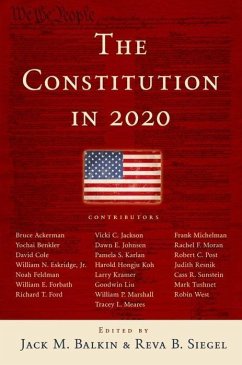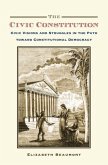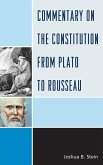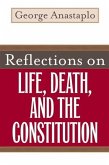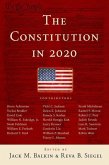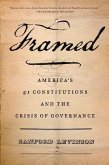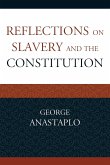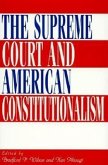The Constitution in 2020
Herausgeber: Balkin, Jack M; Siegel, Reva B
The Constitution in 2020
Herausgeber: Balkin, Jack M; Siegel, Reva B
- Gebundenes Buch
- Merkliste
- Auf die Merkliste
- Bewerten Bewerten
- Teilen
- Produkt teilen
- Produkterinnerung
- Produkterinnerung
The Constitution in 2020 is a powerful blueprint for implementing a more progressive vision of constitutional law in the years ahead. Edited by two of America's leading constitutional scholars, the book provides a new framework for addressing the most important constitutional issues of the future in clear, accessible language. Featuring some of America's finest legal minds--Cass Sunstein, Bruce Ackerman, Robert Post, Harold Koh, Larry Kramer, Noah Feldman, Pam Karlan, William Eskridge, Mark Tushnet, Yochai Benkler and Richard Ford, among others--the book tackles a wide range of issues,…mehr
Andere Kunden interessierten sich auch für
![Civic Constitution Civic Constitution]() Elizabeth BeaumontCivic Constitution113,99 €
Elizabeth BeaumontCivic Constitution113,99 €![Commentary on the Constitution from Plato to Rousseau Commentary on the Constitution from Plato to Rousseau]() Joshua B SteinCommentary on the Constitution from Plato to Rousseau168,99 €
Joshua B SteinCommentary on the Constitution from Plato to Rousseau168,99 €![Reflections on Life, Death, and the Constitution Reflections on Life, Death, and the Constitution]() George AnastaploReflections on Life, Death, and the Constitution34,99 €
George AnastaploReflections on Life, Death, and the Constitution34,99 €![Constitution in 2020 Constitution in 2020]() Constitution in 202027,99 €
Constitution in 202027,99 €![Framed Framed]() Sanford LevinsonFramed38,99 €
Sanford LevinsonFramed38,99 €![Reflections on Slavery and the Constitution Reflections on Slavery and the Constitution]() George AnastaploReflections on Slavery and the Constitution72,99 €
George AnastaploReflections on Slavery and the Constitution72,99 €![The Supreme Court and American Constitutionalism The Supreme Court and American Constitutionalism]() Bradford P WilsonThe Supreme Court and American Constitutionalism214,99 €
Bradford P WilsonThe Supreme Court and American Constitutionalism214,99 €-
-
-
The Constitution in 2020 is a powerful blueprint for implementing a more progressive vision of constitutional law in the years ahead. Edited by two of America's leading constitutional scholars, the book provides a new framework for addressing the most important constitutional issues of the future in clear, accessible language. Featuring some of America's finest legal minds--Cass Sunstein, Bruce Ackerman, Robert Post, Harold Koh, Larry Kramer, Noah Feldman, Pam Karlan, William Eskridge, Mark Tushnet, Yochai Benkler and Richard Ford, among others--the book tackles a wide range of issues, including the challenge of new technologies, presidential power, international human rights, religious liberty, freedom of speech, voting, reproductive rights, and economic rights. The Constitution in 2020 calls on liberals to articulate their constitutional vision in a way that can command the confidence of ordinary Americans.
Hinweis: Dieser Artikel kann nur an eine deutsche Lieferadresse ausgeliefert werden.
Hinweis: Dieser Artikel kann nur an eine deutsche Lieferadresse ausgeliefert werden.
Produktdetails
- Produktdetails
- Verlag: Oxford University Press
- Seitenzahl: 368
- Erscheinungstermin: 26. Mai 2009
- Englisch
- Abmessung: 236mm x 155mm x 25mm
- Gewicht: 658g
- ISBN-13: 9780195387971
- ISBN-10: 019538797X
- Artikelnr.: 26624013
- Herstellerkennzeichnung
- Libri GmbH
- Europaallee 1
- 36244 Bad Hersfeld
- gpsr@libri.de
- Verlag: Oxford University Press
- Seitenzahl: 368
- Erscheinungstermin: 26. Mai 2009
- Englisch
- Abmessung: 236mm x 155mm x 25mm
- Gewicht: 658g
- ISBN-13: 9780195387971
- ISBN-10: 019538797X
- Artikelnr.: 26624013
- Herstellerkennzeichnung
- Libri GmbH
- Europaallee 1
- 36244 Bad Hersfeld
- gpsr@libri.de
Jack M. Balkin is Knight Professor of Constitutional Law and the First Amendment at Yale Law School, and the Founder and Director of Yale's Information Society Project, an interdisciplinary center that studies law and the new information technologies. Professor Balkin teaches and writes in the areas of constitutional law, telecommunications and Internet law, first amendment law, cultural and social theory, and jurisprudence. He is a member of the American Academy of Arts and Sciences and the author of over 80 articles on constitutional and legal theory. He has written op-eds and commentaries for The New York Times, The Boston Globe, the L.A. Times, the Hartford Courant, the New Orleans Times Picayune, the Washington Monthly, and the New Republic Online. Reva B. Siegel is Nicholas deB. Katzenbach Professor of Law and Deputy Dean of Yale Law School, where she teaches constitutional law, antidiscrimination law, and legal history, and serves as faculty advisor to the American Constitution Society chapter. Professor Siegel's writing draws on legal history to explore questions of law and inequality, and to analyze how courts interact with representative government and popular movements in interpreting the Constitution. Much of her recent work analyzes how progressive and conservative movements have struggled to shape constitutional law in matters concerning race, sex, and the family over the last several decades. She is currently writing a series of articles exploring the genesis of the "traditional family values" coalition and the evolving strategies of the anti-abortion movement.
* I. Introduction
*
* Jack Balkin and Reva Siegel (Yale Law School), The Constitution in
2020
* II. Interpreting Our Constitution
* Jack Balkin (Yale Law School), Fidelity to Text and Principle
* Robert Post and Reva Siegel (Yale Law School), Democratic
Constitutionalism
* III. Social Rights and Legislative Constitutionalism
* Cass Sunstein (University of Chicago), The Minimalist Constitution
* Frank Michelman (Harvard Law School), Economic Power and the
Constitution
* William Forbath (University of Texas), Social and Economic Rights in
the American Grain
* Mark Tushnet (Harvard Law School), State Action in 2020
* Robin West (Georgetown Law Center), The Missing Jurisprudence of
Legislated Constitutionalism
* Jack Balkin and Reva Siegel (Yale Law School), Remembering How To Do
Equality
* IV. Citizenship and Community
* Bruce Ackerman (Yale Law School), The Citizenship Agenda
* Goodwin Liu (Boalt Hall Law School), National Citizenship and the
Promise of Educational Opportunity
* Rachel Moran (Boalt Hall Law School), Terms of Belonging
* Richard Ford (Stanford Law School), Hopeless Constitutionalism,
Hopeful Pragmatism
* V. Democracy and Civil Liberties
* Pam Karlan (Stanford Law School) , Voting Rights and the Third
Reconstruction
* Larry Kramer (Stanford Law School), Political Organization and the
Future of Democracy
* Robert Post (Yale Law School), A Progressive Perspective on Freedom
of Speech
* Yochai Benkler (Harvard Law School), Information Structures and the
Constitution of American Society
* Jack M. Balkin (Yale Law School), The National Surveillance State
* Tracey Meares (Yale Law School), The Progressive Past
* VI. Protecting Religious Diversity
* Noah Feldman (Harvard Law School), The Framers' Church-State Problem
and Ours
* William Marshall (University of North Carolina), Progressives, The
Religion Clauses and the Limits of Secularism
* VII. Families and Values
* William Eskridge (Yale Law School), A Liberal Vision of American
Family Law in 2020
* Dawn Johnsen (Indiana University), A Progressive Reproductive Rights
Agenda for 2020
* John Podesta and Mark Agrast (Center for American Progress), Genetic
Technology in 2020
* VIII. State, Nation, World
* Judith Resnik (Yale Law School), What's Federalism For?
* Vicki Jackson (Georgetown Law School), Progressive Constitutionalism
and Transnational Law
* David Cole, (Georgetown Law Center) "Strategies of the Weak":
Thinking Globally and Acting Locally Toward a Progressive
Constitutional VisionHarold Koh (Yale Law School), America and the
World, 2020
*
* Jack Balkin and Reva Siegel (Yale Law School), The Constitution in
2020
* II. Interpreting Our Constitution
* Jack Balkin (Yale Law School), Fidelity to Text and Principle
* Robert Post and Reva Siegel (Yale Law School), Democratic
Constitutionalism
* III. Social Rights and Legislative Constitutionalism
* Cass Sunstein (University of Chicago), The Minimalist Constitution
* Frank Michelman (Harvard Law School), Economic Power and the
Constitution
* William Forbath (University of Texas), Social and Economic Rights in
the American Grain
* Mark Tushnet (Harvard Law School), State Action in 2020
* Robin West (Georgetown Law Center), The Missing Jurisprudence of
Legislated Constitutionalism
* Jack Balkin and Reva Siegel (Yale Law School), Remembering How To Do
Equality
* IV. Citizenship and Community
* Bruce Ackerman (Yale Law School), The Citizenship Agenda
* Goodwin Liu (Boalt Hall Law School), National Citizenship and the
Promise of Educational Opportunity
* Rachel Moran (Boalt Hall Law School), Terms of Belonging
* Richard Ford (Stanford Law School), Hopeless Constitutionalism,
Hopeful Pragmatism
* V. Democracy and Civil Liberties
* Pam Karlan (Stanford Law School) , Voting Rights and the Third
Reconstruction
* Larry Kramer (Stanford Law School), Political Organization and the
Future of Democracy
* Robert Post (Yale Law School), A Progressive Perspective on Freedom
of Speech
* Yochai Benkler (Harvard Law School), Information Structures and the
Constitution of American Society
* Jack M. Balkin (Yale Law School), The National Surveillance State
* Tracey Meares (Yale Law School), The Progressive Past
* VI. Protecting Religious Diversity
* Noah Feldman (Harvard Law School), The Framers' Church-State Problem
and Ours
* William Marshall (University of North Carolina), Progressives, The
Religion Clauses and the Limits of Secularism
* VII. Families and Values
* William Eskridge (Yale Law School), A Liberal Vision of American
Family Law in 2020
* Dawn Johnsen (Indiana University), A Progressive Reproductive Rights
Agenda for 2020
* John Podesta and Mark Agrast (Center for American Progress), Genetic
Technology in 2020
* VIII. State, Nation, World
* Judith Resnik (Yale Law School), What's Federalism For?
* Vicki Jackson (Georgetown Law School), Progressive Constitutionalism
and Transnational Law
* David Cole, (Georgetown Law Center) "Strategies of the Weak":
Thinking Globally and Acting Locally Toward a Progressive
Constitutional VisionHarold Koh (Yale Law School), America and the
World, 2020
* I. Introduction
*
* Jack Balkin and Reva Siegel (Yale Law School), The Constitution in
2020
* II. Interpreting Our Constitution
* Jack Balkin (Yale Law School), Fidelity to Text and Principle
* Robert Post and Reva Siegel (Yale Law School), Democratic
Constitutionalism
* III. Social Rights and Legislative Constitutionalism
* Cass Sunstein (University of Chicago), The Minimalist Constitution
* Frank Michelman (Harvard Law School), Economic Power and the
Constitution
* William Forbath (University of Texas), Social and Economic Rights in
the American Grain
* Mark Tushnet (Harvard Law School), State Action in 2020
* Robin West (Georgetown Law Center), The Missing Jurisprudence of
Legislated Constitutionalism
* Jack Balkin and Reva Siegel (Yale Law School), Remembering How To Do
Equality
* IV. Citizenship and Community
* Bruce Ackerman (Yale Law School), The Citizenship Agenda
* Goodwin Liu (Boalt Hall Law School), National Citizenship and the
Promise of Educational Opportunity
* Rachel Moran (Boalt Hall Law School), Terms of Belonging
* Richard Ford (Stanford Law School), Hopeless Constitutionalism,
Hopeful Pragmatism
* V. Democracy and Civil Liberties
* Pam Karlan (Stanford Law School) , Voting Rights and the Third
Reconstruction
* Larry Kramer (Stanford Law School), Political Organization and the
Future of Democracy
* Robert Post (Yale Law School), A Progressive Perspective on Freedom
of Speech
* Yochai Benkler (Harvard Law School), Information Structures and the
Constitution of American Society
* Jack M. Balkin (Yale Law School), The National Surveillance State
* Tracey Meares (Yale Law School), The Progressive Past
* VI. Protecting Religious Diversity
* Noah Feldman (Harvard Law School), The Framers' Church-State Problem
and Ours
* William Marshall (University of North Carolina), Progressives, The
Religion Clauses and the Limits of Secularism
* VII. Families and Values
* William Eskridge (Yale Law School), A Liberal Vision of American
Family Law in 2020
* Dawn Johnsen (Indiana University), A Progressive Reproductive Rights
Agenda for 2020
* John Podesta and Mark Agrast (Center for American Progress), Genetic
Technology in 2020
* VIII. State, Nation, World
* Judith Resnik (Yale Law School), What's Federalism For?
* Vicki Jackson (Georgetown Law School), Progressive Constitutionalism
and Transnational Law
* David Cole, (Georgetown Law Center) "Strategies of the Weak":
Thinking Globally and Acting Locally Toward a Progressive
Constitutional VisionHarold Koh (Yale Law School), America and the
World, 2020
*
* Jack Balkin and Reva Siegel (Yale Law School), The Constitution in
2020
* II. Interpreting Our Constitution
* Jack Balkin (Yale Law School), Fidelity to Text and Principle
* Robert Post and Reva Siegel (Yale Law School), Democratic
Constitutionalism
* III. Social Rights and Legislative Constitutionalism
* Cass Sunstein (University of Chicago), The Minimalist Constitution
* Frank Michelman (Harvard Law School), Economic Power and the
Constitution
* William Forbath (University of Texas), Social and Economic Rights in
the American Grain
* Mark Tushnet (Harvard Law School), State Action in 2020
* Robin West (Georgetown Law Center), The Missing Jurisprudence of
Legislated Constitutionalism
* Jack Balkin and Reva Siegel (Yale Law School), Remembering How To Do
Equality
* IV. Citizenship and Community
* Bruce Ackerman (Yale Law School), The Citizenship Agenda
* Goodwin Liu (Boalt Hall Law School), National Citizenship and the
Promise of Educational Opportunity
* Rachel Moran (Boalt Hall Law School), Terms of Belonging
* Richard Ford (Stanford Law School), Hopeless Constitutionalism,
Hopeful Pragmatism
* V. Democracy and Civil Liberties
* Pam Karlan (Stanford Law School) , Voting Rights and the Third
Reconstruction
* Larry Kramer (Stanford Law School), Political Organization and the
Future of Democracy
* Robert Post (Yale Law School), A Progressive Perspective on Freedom
of Speech
* Yochai Benkler (Harvard Law School), Information Structures and the
Constitution of American Society
* Jack M. Balkin (Yale Law School), The National Surveillance State
* Tracey Meares (Yale Law School), The Progressive Past
* VI. Protecting Religious Diversity
* Noah Feldman (Harvard Law School), The Framers' Church-State Problem
and Ours
* William Marshall (University of North Carolina), Progressives, The
Religion Clauses and the Limits of Secularism
* VII. Families and Values
* William Eskridge (Yale Law School), A Liberal Vision of American
Family Law in 2020
* Dawn Johnsen (Indiana University), A Progressive Reproductive Rights
Agenda for 2020
* John Podesta and Mark Agrast (Center for American Progress), Genetic
Technology in 2020
* VIII. State, Nation, World
* Judith Resnik (Yale Law School), What's Federalism For?
* Vicki Jackson (Georgetown Law School), Progressive Constitutionalism
and Transnational Law
* David Cole, (Georgetown Law Center) "Strategies of the Weak":
Thinking Globally and Acting Locally Toward a Progressive
Constitutional VisionHarold Koh (Yale Law School), America and the
World, 2020

